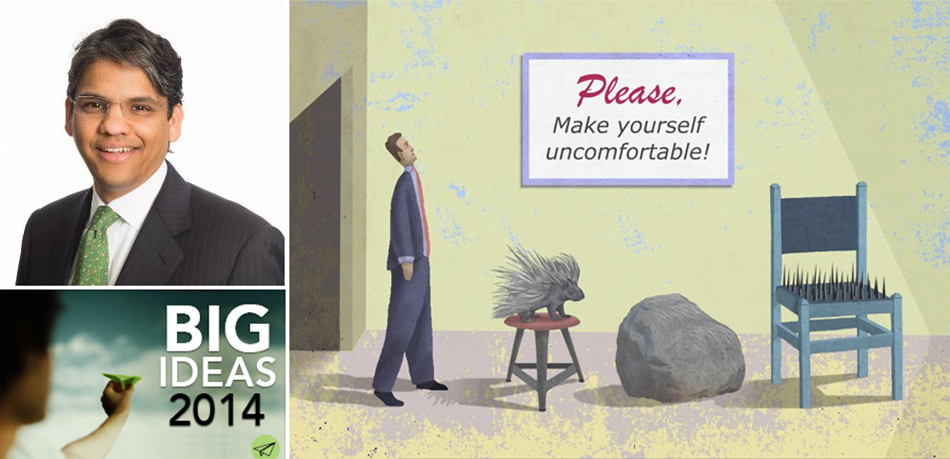LinkedIn: Cognizant CEO Says Discomfort is the New Comfort Zone
 |
“It’s time for businesses and individuals to get more comfortable with their discomfort zones and power through the obstacles that prevent them from seizing new opportunities and achieving their potential,” writes Francisco D’Souza as part of a series in which LinkedIn Influencers pick one big idea that will shape 2014. “By recognizing that we live in a perpetual discomfort zone—and thinking and acting accordingly—we can transform businesses, blaze new competitive trails, expand our capabilities, and continuously drive outstanding performance and value.”
According to D’Souza, in business, the comfort zone has never been a good place to be. “Companies that get too comfortable risk becoming irrelevant, obsolete—and extinct,” he says. “This is particularly true in today’s business world where the forces of globalization; new social, mobile, analytical and cloud technologies; and fast-changing customer, employee and partner demands encroach on our comfort zones daily—making discomfort the new comfort zone.”
So, how do organizations and individuals function in a perpetual discomfort zone? “I believe the answer is to think fast and think forward,” D’Souza says. “Thinking fast means abandoning prolonged strategic debates in favor of rapid, real-time, data-driven decisions. Don’t become mired in discomfort, be agile in responding to it. Thinking forward means creating new business models, processes and workplace environments that enable us to ride the next wave of innovation—intentionally establishing new areas of discomfort.”
D’Souza then goes on to offer suggestions to enterprises, partner ecosystems and employees on how to navigate and compete in the discomfort zone. Enterprises, he says, must decode the rising volume of data surrounding customers, markets and products, and realize that data analytics and advanced algorithms are indispensable assets in interpreting the meaning and implications of that data to smartly move from insights to foresights. Enterprises must also be able to drive greater effectiveness and efficiency on one hand, and invest in growth-enabling innovation on the other hand. “Businesses that are ambidextrous in mastering both parts of this mandate will have the agility to maneuver through a perpetual discomfort zone—competing more effectively and delivering increasing value,” he says.
“Because inspiration and innovation may come from customer insights, employee-led solutions or partner relationships, companies must establish new partner ecosystems to co-create new products and services that fuel growth,” he adds. “Today, the core versus context distinction is less clear-cut and highly fluid. We must recognize that what is core today may be context tomorrow, and vice versa.”
Employees, D'Souza suggests, must escape conventional norms by taking on professional challenges beyond their personal comfort zones. “It also helps to be aware of the “blind spots” that keep us from seeing an opportunity for change or the value of constructive criticism,” he notes. “Employees also need to make continuous learning a permanent part of their job description. In the perpetual discomfort zone, it’s not what you know today that counts—it’s how you acquire, refine and apply new knowledge for tomorrow.”
Click here to read more.
